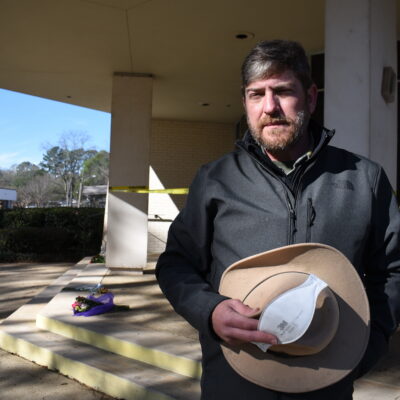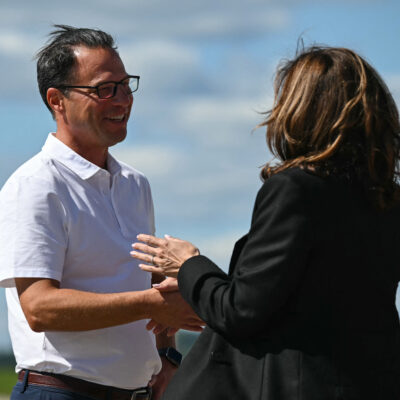
Courtesy Bnai Zion
Israelis from Tel Aviv to Haifa brace for Hezbollah attacks
Haifa’s Bnai Zion hospital moves patients underground, while residents of central Israel try to continue their routine despite Hezbollah missile; Israelis evacuated from Lebanon border call for proactive military moves to allow them to return home
Carmel Shama-Hacohen started Wednesday morning like any other: Checking WhatsApp in bed. The mayor of Ramat Gan, one of Israel’s most populous cities, abutting Tel Aviv, was reading messages from residents, when Hezbollah shot a missile towards central Israel. An air raid siren went off and he moved to his home’s safe room.
Less than two hours later, Shama-Hacohen was nonplussed, telling Israel’s national broadcaster Kan that the most important thing is that the Home Front Command is still letting children in central Israel go to school as normal, so that adults can go to work and the economy – including Israel’s diamond district, based in Ramat Gan – can continue to function.
“The public is very calm this time, in contrast with other rounds when there was hysteria,” Shama-Hacohen told Kan. “My WhatsApp is usually blowing up with [Ramat Gan residents’] concerns and fears. Not this time.”
While it has long been known that Hezbollah has missiles capable of reaching Tel Aviv, Israel has been preparing for Haifa to be the epicenter of the Iran-backed terror group’s escalating attacks as it expands the radius of its missile targets, much as Israel’s third-most populous city and the largest city in the north was in the 2006 Second Lebanon War.
While the IDF’s Home Front Command has declared a “special situation” throughout Israel, only the country’s north has limitations. Between the Lebanon border to just south of Haifa, all schools are closed this week, as are the beaches, even though the weather is in the 80s. Outdoor gatherings are limited to 10 people and indoor to 100. Workplaces can only open if there is a safe room or shelter close enough to reach within seconds.
Dr. Ohad Hochman is the CEO of a workplace that cannot shut down in emergencies – the Bnai Zion Medical Center in Haifa, which includes northern Israel’s only soldier rehabilitation hospital. When Home Front Command published new guidelines for the city on Sunday, Hochman oversaw the transfer of the medical center’s hundreds of patients – including newborns in the neonatal intensive care unit – to an underground facility.
“We have a new building that is built like a shelter,” Hochman, the former chief medical officer of the Israeli Navy, told Jewish Insider this week. “We built it as part of the lessons learned in the Second Lebanon War, when a missile fell next to the hospital. The ground level is a protected emergency room, and under that are areas for those who are admitted.”

Bnai Zion planned to open the facility in early 2024, but ended up moving the hospital’s emergency room to the new building on Oct. 9, 2023. This week is the first time that the medical center’s entire operations – except for elective surgeries, which have been put on hold – were moved to the underground hospital.
“When there was a siren in the Haifa area [on Monday],” Hochman recalled, “all of the patients were already in a protected area, and all we had to do was wait for the siren to end. We felt very safe. The moment there is an alarm, everyone here is in a safe situation.”
The hospital is emptier than usual, Hochman said, noting that he could hear booms and see the Iron Dome defense system intercepting missiles from his office window during his phone call with JI.
“People are only coming to us now if it’s a real emergency,” he said. “Because people are not going out, there are fewer injuries, car accidents, acts of violence.”
One Haifa resident hunkering down at home is Sima Nachshon, 71, who said she already had her safe room prepared for the possibility of an escalation with Hezbollah.
“There is a lot of hysteria. It’s a very unpleasant feeling,” Nachshon told JI. “Up until a week ago, we went out to cafes, like people in Tel Aviv, but then suddenly people stopped going out. We suddenly felt the lack of security. You’re alert all the time.”
“I was cooking, and then I thought to myself, ‘If there’s a siren, I have to remember to turn the gas off before I run to the safe room.’ I think about how to set things up in order not to be too stressed,” she said.
Nachshon has grandchildren who live nearby, in an apartment without a safe room and only a bomb shelter for the whole building: “If they need to run to the shelter too often, they will come to me. But if they have to run from time to time, it’s not so bad. We have to see what is happening hour by hour and then decide how to act.”
Still, Nachshon emphasized that Haifa residents have it better than many other Israelis. “I feel a little embarrassed talking about myself when people have been experiencing this day after day,” she said.
“I’m almost 72 years old now and our country has been through a lot. We’ll get through this,” she added.
This week was nothing new for Nisan Zeevi, a resident of Kfar Giladi in the upper Galilee and founder of Lobby 1701, an organization that calls for international pressure to force Hezbollah north of the Litani River, as specified in U.N. Security Council Resolution 1701.
“We residents in the line of fire have been at war for 11 months,” he said. “There have been over 8,500 rockets [launched by Hezbollah], 1,200 precision missiles, 1,300 drones, 43 killed, 180 injured … Some of us have been evacuated for a long time. Our communities have almost totally fallen apart.”
Speaking to JI, Zeevi periodically interrupted himself with exclamations of “wow” as he saw and heard Iron Dome interceptions in the distance: “That must be at least 70,” he said.

Before Hezbollah began its assault on Israel’s north on Oct. 8, Zeevi spent his days as vice president of Margalit Startup City – Galil, meant to nurture the tech sector in Israel’s north. Since then, Zeevi said, “many of the things we built here were destroyed … food-tech, agro-tech, dozens of startups, hundreds of jobs.”
Zeevi has done IDF reserve duty in the war and is on Kfar Giladi’s security squad. His wife and two sons, ages 5 and 8, were evacuated almost a year ago to the lower Galilee, but they periodically visit home as a family to make sure the children retain a sense of belonging.
Zeevi called on the government to be “more proactive” to bring security back to Israel’s north so that the residents of moshavs and kibbutzim near the Lebanon border can return home.
“We trusted the international community and the government of Israel that they would make sure that UNSCR 1701 was implemented and there would be no Hezbollah between the border and the Litani, and that UNIFIL [the U.N. Interim Force in Lebanon] was making sure it would happen … but no one made sure the resolution was being implemented. Now they’re saying they can’t do it, so we demand that our government enforce it militarily,” he said.
Residents of Israel’s north need “security, not just a feeling of security,” Zeevi said. “Cameras or a higher wall are not security.”
“There is no diplomatic agreement with a terrorist organization that says they want to conquer and kill us … I say this as a leftist,” said Zeevi, a former aide to Knesset members from Kadima and Yesh Atid.
The detonations last week of pagers belonging to Hezbollah members are helping restore trust in Israel’s security establishment, Zeevi said, but added that “the job won’t be done with a display of pyrotechnics … We need to create a buffer zone of at least 15 km. in Lebanon’s territory, a no-man’s land with nothing there. No terrorists, not even children, nothing … That is the only way to deal with the threat of an anti-tank missile aimed at the window of a home. There is no Iron Dome for that.”
Despite it all, Zeevi was optimistic, noting that projects, such as a new medical center in Kiryat Shmona sponsored by JNF-USA, are still moving forward.
“It’s hard to picture the future while we are in this catastrophe, but we have no choice,” he said. “After this evacuation of over 70,000 people … we need not just to bring people back, but to bring more people … We need to rehabilitate the communities, build good educational institutions, provide grants for teachers so they will move here, because what happened in the last 11 months is that our region was turned into one that is illegitimate to live in. We saw the Shi’ite jihadists and folded up our Zionist idea and retreated. It was a very anti-Zionist act.”






